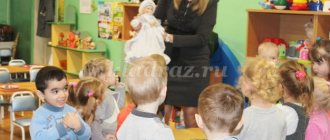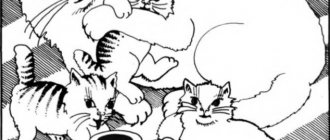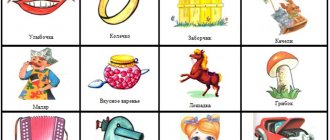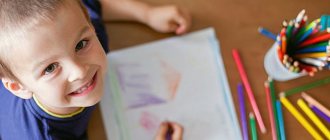Extracurricular work with children with disabilities
Pedagogical classification of children with disabilities
Features of extracurricular work with children with disabilities are related to the specifics of their diseases.
Children with disabilities are children aged 0 to 18 years with physical and (or) mental disabilities who have limitations in their ability to live due to congenital, hereditary, acquired diseases or consequences of injuries, confirmed in the prescribed manner. Based on the pedagogical classification, several categories of violations are distinguished. Hearing impairment (deaf and hard of hearing).
They have persistent bilateral hearing impairment, which makes verbal communication with others through oral speech difficult or impossible.
Visual impairment (blind, visually impaired).
They have an organic lesion of the visual analyzer, which prevents the use of vision in orientation and cognitive activities.
Musculoskeletal disorders.
They have organic damage to the motor centers of the brain, leading to the impossibility or partial impairment of movements of the musculoskeletal system in time and space.
Severe speech disorders.
They have psychophysical abnormalities that cause disorders of the communicative and cognitive (generalizing) functions of speech.
Impaired mental function
. They have a slow rate of formation of higher mental functions, leading to a persistent state of immaturity of the emotional-volitional sphere and intellectual failure.
Intellectual development disorders.
They have organic damage to the brain, causing impairment of higher cognitive processes and persistent irreversible impairment of mental development, primarily intellectual.
Violation of the emotional-volitional sphere
(heterogeneous group, including autism) Have various clinical symptoms and psychological and pedagogical characteristics, leading to impaired development of communication and social skills.
Complex developmental disorder.
Have a combination of two or more primary disorders (visually impaired with mental retardation, hearing impaired with cerebral palsy)
100 parenting mistakes that are easy to avoid
What is this book about? This is the most detailed guide to parental mistakes, ways to avoid and eliminate them. The author examines the most common mistakes that all parents either make or are very afraid to make. You will learn how to: become a true friend to a child without losing your authority; communicate with your child without repeating the mistakes of your parents; respond correctly to the child’s whims and disobedience; satisfy the child’s need for love without spoiling him; develop the child taking into account the characteristics of his personality; instill in your child the correct idea of happiness and success. Who is the author Olga Makhovskaya - a famous psychologist, candidate of psychological sciences, employee of the Institute of Psychology of the Russian Academy of Sciences, VGIK. Fellow of international scientific programs. Director of content for the children's television project "Sesame Street in Russia", author and presenter of programs for parents. Author of the books “American children play with pleasure, French children play according to the rules, and Russian children play until they win”, “How to calmly talk to a child about life, so that later he will let you live in peace.”
Buy
Extracurricular tasks
Rehabilitation and social education of children with disabilities proceeds in three directions.
1. “I am like self-worth.” Problems: inadequate self-esteem, lack of a stable hierarchy of motives and goal setting. Objectives: to form a positive self-concept, that is, confidence in the friendly attitude of other people, confidence in success in various activities and a sense of self-worth.
2. “Me and you.” Problems: speech disorders, impulsiveness, thoughtlessness of actions and inability to think critically about them. Inability to negotiate and focus on the interlocutor. Objective: to develop speech, teach to consciously communicate, cooperate, negotiate, distribute responsibilities, treat other people well and help them.
3. “Me and the world.” Problems: psychological, moral, spiritual immaturity and lack of professional interests. Objectives: through participation in productive socially useful activities, reduce anxiety and fear, develop moral and spiritual qualities, and help decide on a profession.
Forms of extracurricular activities
Individual
. Stimulates the formation of the skill of independent work through conversations with teachers and psychologists, preparation of research and creative projects, solo performances, selection of exhibits for thematic exhibitions, production of manuals.
Circle.
Develops innate inclinations and abilities for creative, scientific, technical, and sports activities. The main thing is that children realize the real result of their work.
Applied mugs.
Crocheting, beading, sewing, carpentry, wood carving, floristry (creating appliqué collages from dried plants). Participation of works in exhibitions, competitions, fairs is desirable. As a result:
- fine motor skills develop
- thinking is activated
- anxiety level decreases.
- professional interests are identified
Aesthetic mugs.
In dance clubs, through dance and improvisation, norms of behavior are taught, which are transferred to society. Theater clubs develop speech and communication by uniting children with disabilities, healthy children and parents into a team to prepare for performances. Music clubs offer choral singing and playing noise instruments. We work with children with musical abilities in individual lessons. Such circles help:
- develop speech
- feel your body
- act in time and space
- freely express feelings and emotions
- realize your ideas
- learn the rules of behavior and constructive communication
- build empathy
- loosen up and increase self-esteem
- develop creative and cognitive activity
Technical and IT circles.
Automobile modeling, rocket modeling, aircraft modeling and ship modeling offer an integrated training system: designing models, participating in competitions, excursions to museums and enterprises, meetings with specialists in the field being studied. The same techniques are used when teaching IT technologies. The result is:
- development of fine motor skills, visual perception, memory, attention
- development of intelligence
- activation of imagination, imaginative thinking, ingenuity
- ability to work with information
- leadership development
- conscious choice of profession
Sections of adaptive sports,
especially sailing and equestrian, implying compliance with high spiritual values. In general the sport:
- shifts the emphasis from “features” of development to the development of abilities
- increases the functionality of the body
- has a beneficial effect on the psyche
- mobilizes will
- expands your social circle
- Gives you the skill to compete
Uniting
. Creates a wide space for communication and develops skills of productive cooperation and collective self-government. Children's clubs: specialized, creative, patriotic. For example, “Intellectual Games Club”, “Ecological Club”. Each club has a name, a charter, operates in sections and on the basis of self-government.
School museums: historical, local history, natural history, historical and literary, art. While collecting material for exhibitions, children participate in hikes and scientific expeditions, work in archives, and correspond. The materials are used in lessons and are introduced to parents, school guests, and residents of the region. Thus, a few years ago, a project, a full-length film “What is the Holocaust?”, created on the basis of a school museum by two tenth-graders, one of them with disabilities, won a city competition in Moscow.
If it's difficult with a child
A new book by a famous family psychologist, winner of the Russian Presidential Prize in the field of education, author of the bestsellers “What to do if ...” and “What to do if ... 2” is addressed to parents of children and adolescents with behavioral characteristics. The publication will help you find a common language with your child, navigate difficult situations and conflicts, get out of them with dignity, maintain patience, restore understanding and peace in the family. Children don't listen to their parents about how much this world is worth. In an attempt to teach a “careless child” how to “behave”, responsible parents arm themselves with the latest psychological “tricks”, learn modern techniques for sitting on buckwheat, and children in response only become more and more irritable and disobedient. What hinders us in our relationship with a child, and what prevents him from behaving better? Lyudmila Petranovskaya’s new book will be useful to parents who are desperate to find a common language with their children. You will be able to learn how to navigate difficult situations, resolve conflicts and come out of them with dignity. The book will help maintain patience, restore understanding and peace in the family.
Buy
Associations such as interest groups, health groups, weekend groups, using a multisensory environment: sensory interactive rooms that correct violations of perception channels.
Massive.
Develops the emotional-volitional sphere, cognitive interests, creative abilities, simultaneously covering a large number of students and parents. Forms of mass work - school and regional concerts and holidays, shows, subject decades, Olympiads, military sports, physical education and health events with the involvement of parents. Participation in all-Russian projects (for example, “Dream Skis”).
Project “Dream Skis”
Educational, role-playing, creative, outdoor games, quest games are also mass work:
- Brain-ring “Path to the Stars”
- Game program “Like Shrovetide Week”
- Military sports game "Zarnitsa"
- Contest of methodological developments “World Health Day”
- “Childhood Holiday” for school-age children in the pediatric traumatology department
The tasks of spiritual, moral, aesthetic, and patriotic education are solved by excursions to museums, art galleries, visits to performances, and concerts. But it is necessary to find out in advance about the availability of special equipment for people with disabilities in the premises and discuss with the guides the specifics of presenting information.
The system of corrective measures for environmental education and health protection includes hikes, excursions to nature reserves and, as animal-assisted therapy, to dolphinariums and oceanariums, visits to stables and sled dog centers.
Cool hours and conversations.
They educate morally, spiritually, in the spirit of a healthy lifestyle. For example, a series of class hours “Nutrition and Health”. Children give presentations on “Healthy Products”, “Vitamins in Our Life”, “Proper Nutrition and Intelligence”. A nutritionist and a chef are invited for a conversation.
- Class hour “Good mood as one of the aspects of a healthy lifestyle”
- Class hour “Kindness and charity in the modern world”
- Class hour “Happiness is in the little things, You need to go and just enjoy life”
The importance of including a child with disabilities in extracurricular and extracurricular activities lies in his successful socialization, the opportunity to realize social, spiritual, moral, aesthetic, and physical needs.
Children with disabilities find themselves in a situation that is as close as possible to the conditions and lifestyle of society, and have every chance to achieve significant success. A big book about you and your child
Every parent has been baffled by their child's behavior at some point.
That is why a large book on education appeared, which contains two bestsellers by the beloved psychologist of millions Lyudmila Petranovskaya. The publication includes the books “Secret Support: Attachment in a Child’s Life” and “If It’s Difficult with a Child.” This book should be read by all parents. And for those who are concerned about slight misunderstandings, and for those who were already desperate to find a common language with children. In it we have collected two books in one: “Secret support: attachment in a child’s life” and “If it’s difficult with a child” - books that can save you and your child from tons of psychological waste paper. Often, when we become adults, we forget that we were once children ourselves. In the first part of the book, based on the scientific theory of attachment, she easily and accessiblely talks about the role of parents on the path to adulthood: “How do dependence and helplessness turn into maturity?” and “How does our love and care, year after year, form in a child a secret support on which, like a pivot, his personality rests?” You will be able to see what actually lies behind children's “whims,” “spoiledness,” “aggression,” and “harmful character.” In the second part of the book, Lyudmila will talk about how to learn to navigate difficult situations, resolve conflicts and get out of them with dignity. You will be able to understand how to help your child so that he grows and develops without wasting energy fighting for your love. Buy
Psychological lesson for children with disabilities
Correctional and developmental classes on the formation of an adequate attitude towards oneself: self-esteem, self-perception of children with disabilities (formation of personal AUD)
Target
: Formation of adequate self-esteem of the student. I'm real,
I am potential.
Tasks
: Relieving anxiety, lack of confidence in one’s capabilities, abilities, or lack of self-criticism.
Progress of the lesson:
Game "If I Were a Star"
Goal: development of imagination, awareness by children of their real and potential capabilities.
Description: the psychologist invites children to fantasize and complete the phrase:
- If I were a star, then I………
- If I were the wind, then I………
- If I ended up on the moon, then I………
- If I lived in a beautiful castle, then I………
- If I were invisible, then I………
- If I were the kindest, then I………
- If I were a teacher, then I………
- If I were a lifeguard, then I would………
- If I were a doctor, then I………, etc.
Game exercise “I can’t - I can - I can”
Target:
reducing the child’s anxiety, increasing confidence in their capabilities and abilities.
Description:
the psychologist imagines his peer who knows much less than he does and cannot cope with a certain task (can’t speak, doesn’t know numbers, etc.), and portray such a child. Then asks to imagine and portray a child who can cope with the task.
The psychologist invites the child to place his hands on his open palms, and the whole group of children pronounces a “magic spell”: “I can’t...” - and everyone takes turns talking about their difficulties; "I can……." - and the children in line say what they can do; “I can do it...” - and everyone says that he will complete the tasks if he makes every effort.
The psychologist does not comment on the children’s remarks, drawing attention to the fact that he can’t do something, can’t do something, and everyone will be able, if they want, to achieve progress and, therefore, be no worse than others.
Game "Hare-Bragging"
Target:
harmonization of claims for recognition.
Description:
psychologist “Let's remember the fairy tale about the Boasting Hare and Aunt Crow. In the fairy tale, a hare stood on a stump in front of other hares and boasted: I am the smartest, I am the bravest, the most cunning! And Aunt Crow patted him by the ear and did not allow him to brag. And then the dogs came running, caught Aunt Crow and began to thrash her, and the Hare helped her free herself. And the Raven saw that the Hare was not bad, but a good fellow. And now each of you will be a little Boastful Hare, stand on a chair and say very loudly: “I am the most, the most...”.
Note. Not all children will be able to boast the first time; many children will be embarrassed to complete the exercise. There is no need to insist; if the exercise is repeated several times, almost everyone does it.
After all the children have been the “Bragging Hare,” you can invite them to reflect on the fact that most children were not actually boasting, but were telling the truth about themselves.
You can invite the children to then repeat a phrase about themselves, only without the words “the best,” and the group repeats the same phrase in chorus, for example: “You are smart, beautiful and affectionate.”
Game "Circle of Good"
(Shirokova T.I.)
Target:
stimulating the development of positive emotions, creating an atmosphere of goodwill and mutual understanding in children’s communication with each other.
Description:
children stand in a circle, in .
The psychologist uses a counting rhyme to choose a driver:
- One two three four five,
Let's start playing in the circle of goodness,
The driver quickly appears,
Sit on the magic chair!
The driver sits on a magic chair and can be asked to close his eyes.
Children holding hands say the words:
- We stand in the circle of goodness,
We will send good things to Anya (Sasha...).
Children approach the leader and whisper kind words and gentle touches, then quickly return to the circle.
The driver opens his eyes, thanks the children, talks about his feelings, sensations and chooses another driver.
Exercise “Stand in his (her) place”
Target:
learning the ability to understand and accept the feelings of another person.
Description:
The psychologist describes to children life situations close to them and invites them to “guess” the feelings of the characters. The heroes of situations should be both peers and adults.
Example situations:
“When a child falls and breaks his knee, he feels......, his mother feels.......”
“When the guys don’t want to play with Pavlik, he feels........”
“When children quarrel in class, they feel……., the teacher feels…..”.
“When a girl goes to bed, she feels……….”
If children find it difficult to answer, you can play out the situations.
Game “If yes, clap, if no, stomp”
Target:
development of children's communication skills, auditory attention.
Description:
the psychologist names the proposals, and the children must evaluate them and express their attitude by clapping their hands if they agree, or stamping their feet if the statement is incorrect.
For example:
- “Roma visited his grandmother and was so happy that he was offended by her.”
- “Sasha took the toy from Misha and beat him, so Misha quarreled with him.”
- “Alena really liked Seryozha, so she beat him.”
- “Maxim gave Dasha candy, and she was very happy.”
- “Seryozha saw that Maxim gave Dasha candy, he was offended that he himself did not do this and therefore quarreled with Maxim.”
Note. At the end of the game, the psychologist tells the children that resentment and anger go hand in hand with quarrels, and quarrels make a person lonely, since no one wants to talk or play with him.
Situations can be selected from the lives of children.
Lesson reflection.
Target:
find out the children’s feelings, what they liked and what they didn’t like in the lesson.
Description
: The psychologist asks the children questions that relate to the children’s feelings:
“Did you like the lesson?”
“Which exercise did you like best?”
“Which exercise didn’t you like the most?”
“What feelings did you experience during the lesson?”








